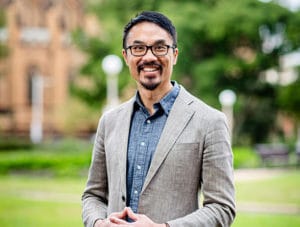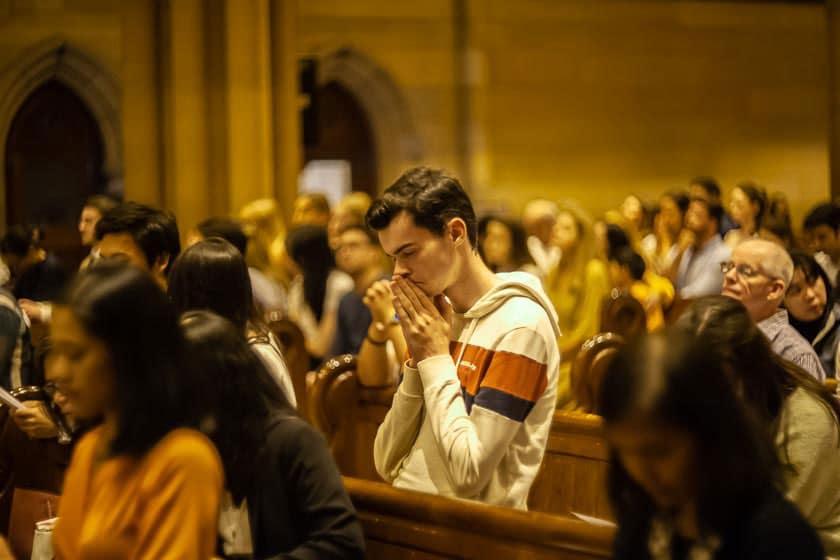
While Christianity has been at the root of many aspects of Western culture, and many of the social institutions that emerged from this Christian faith endure, we also know Australians are getting used to getting by without it. However, the increasing focus on evangelisation in our Church is not a late and panicked response motivated by the mere cause of self-preservation. Evangelisation is, most deeply understood, the manifestation of Christ’s life in us, the indwelling of his Spirit, and a response of faith. This keynote will address present challenges for evangelisation in our culture as the Church navigates a changing world for the sake of Christ’s mission, as well as foundational ways forward for Catholic communities, schools and agencies to embed the life of discipleship and pathways for personal conversion in our communities, structures and ways of doing things.

Introduction
It’s great to be with you and thank you to Archbishop Prowse and the National Centre for Evangelisation for the invitation to speak with you this evening.
One of the first points I’d like to share is that the increasing focus on evangelisation in our Church is not a late and panicked response to emptying pews, declining affiliation and decreasing social and political influence in Australia.
It is true that as a Church we are at a critical moment. Some of the concerning trends in the participation rates and vitality of our local communities have only been accelerated by the pandemic from which we are slowly emerging. While we know Christianity has been at the root of many aspects of Western culture, we also know many Australians are becoming accustomed to getting by without it.
However, our Church’s commitment to evangelisation in Australia is not motivated by the cause of self-preservation or security. As St Thomas Aquinas wrote with relevance to the Church, if the highest aim of a captain were to preserve his ship, he would keep it in port forever.
The mission with which we are entrusted is to open to all humanity to the encounter with the risen Christ who, in his Holy Spirit, is the heart, summit and instigator of the Church’s mission. It is this encounter with the living Christ that is the spark of lifelong worship, the manifestation of gifts and charisms, faith’s hunger for understanding, the discernment of vocation, the sharing of the Gospel with others, and justice that lasts.
The mission with which we are entrusted is to open to all humanity to the encounter with the risen Christ
At heart, the desire to evangelise is the manifestation of Christ’s life in us, the indwelling of his Spirit, a Spirit that keeps us faithful to Jesus in the present and equally compels us as a Church to set sail, leave port and navigate the waters of the world for the sake of His mission.
Today we live not merely in an age of change but a “change of age” as Pope Francis puts it. Many who are committed to the mission of Jesus, and even some who are not, are asking how the Catholic Church in Australia can best respond to a world of ideas and culture which are radically different than what we knew just a few short decades ago. It is a fair question to which we are compelled to offer a response, a reason for our hope (1 Peter 3:15).
A New Heart for Evangelisation
Before we as Catholic evangelists grasp for new methods, expressions or initiatives in response, what I think the times demand of us is fundamentally a new heart, one convinced of the primacy and urgency of evangelisation in a society which is at once post-Christian yet spiritually poor and hungry.
As the English writer Julian Barnes noted of so many of us in the West, “We don’t believe in God but we still miss him”. Like the crying onlookers in France amidst the ashes of Notre Dame Cathedral, many in the increasingly secular West remain resistant to religion but are still haunted by our Christian origins.
For such a time as this, a new heart is needed in Australia for evangelisation to be fruitful. As Pope Francis underscores, “It is impossible to persevere in a fervent evangelisation unless we are convinced from personal experience that it is not the same thing to have known Jesus as not to have known him, not the same thing to walk with him as to walk blindly, not the same thing to hear his word as not to know it, and not the same thing to contemplate him, to worship him, to find our peace in him, as not to” (EG 266).
As such our commitment to evangelisation is self-implicating. It will reflect in a good measure the depth of our faith. Do we believe Jesus is who He says He is, and do we believe His message is true? Those two questions are usually enough to get us going and keep us going in mission when our energy is low or at the times when the work of renewal in our communities can seem hard or even overwhelming.
As experienced at our recent Plenary Council in Australia, it can be all too tempting for us as Catholics, our Catholic institutions and agencies to replace this call to personal faith in Jesus Christ with mere ethical action. This is because it can seem easier to all ‘get along’ on the basis of good works, or to opt out of ‘big church’ in favour of boutique gatherings of like-minded Christians.
our commitment to evangelisation is self-implicating. It will reflect in a good measure the depth of our faith
In a culture of outrage and polarisation, we can be found afraid to ruffle the feathers in raising as a central concern a person’s faith in the existence of a personal God, the teachings of Christ, in the Church and a sacramental hierarchy as a part of that Catholic faith, or the need of personal repentance, conversion and the question of salvation which presses upon us all.
It could also be suggested that one of the other reasons why evangelisation can be minimised or found embarrassing by some is that many of our own, including our leaders, may not have had an experience of life-changing conversion. It is this encounter and the full surrender of our lives to Christ, that makes evangelisation a gift rather than a heavy burden.
A new heart for evangelisation entails expecting fruit rather than succumbing to a quiet sense of hopelessness, or else a loud cynicism that ‘nothing can change’. Christ calls his disciples to bear fruit, fruit that will last (John 15:16). In this mission of evangelisation, we are neither to be Pelagian, as if the fruit of changed lives could be the product of our own efforts, nor take up a Quietism that ‘spiritualises’ a lack of fruit, as if Christ’s call to make disciples never applied to us personally or demanded initiative or any effort on our part.
Instead, we are called to the faith-filled expectation that people can change, or moreover that Christ can change people. We see this in Mark’s Gospel, most notably in the people of Capernaum who expect fruit, in comparison to those in Nazareth for whom Jesus is all-too-human, familiar and mundane.
In Capernaum we see Christ’s healing of the paralytic carried by four friends (Mk 2). Their expectation leads them to break through the barriers to their access to Christ. They anticipate that this Jesus is the mercy of God who can heal, restore and raise up all that is paralysed and seemingly immovable in their lives.
Just four chapters later in Mark, Jesus is in his hometown of Nazareth. And it is here that Jesus, we hear, can do no miracles in this place. The Scriptures tell us, ‘He could do no deed of power there… and he was amazed at their unbelief’ (Mark 6:6).
As is the nature of love itself, Christ does not impose himself upon a hardened heart or heap his presence upon us but awaits our invitation, listens for our longing, awaits our readiness, for the hope of his love. Jesus beckons us to ask, knock and seek the renewal that only he can bring about, so we might receive, enter, and find him there, waiting for us in the heart of time. A new heart for evangelisation expects change, expects lives to be changed by his grace.

Making Change
Of course, evangelisation is much easier to talk about than do. The practical difficulties in changing the hearts and desires of our own people in our parishes, schools and agencies for this mission can be significant and our Catholic culture in Australia, as elsewhere, leans heavily toward the status quo.
In these times, which are not for us, it can be all too easy for us as a Church to turn inwards, ‘make do’ with sacramentalised attenders and half-catechised atheists rather than make missionary disciples. The Church could not be clearer that we must be outward focused on making disciples, disciples who then make disciples of others and transform the world by their faith. An explicit focus on the ‘unchurched’ rather than our own self-preservation – in the example of Christ himself who came to ‘seek out and save the lost’ – can make some of our own people and our communities feel a little uncomfortable, like the older brother in the parable of the Prodigal Son.
After all, the older brother has been utterly loyal and committed and served his Father’s house all this time. However, when he realises it is not about him but about the one who has been lost, the older brother struggles to rejoice at one who had not earned his welcome but whom the Father nevertheless embraces and lavishes upon with love.
We know in the mind of Jesus that the older brother is just as lost because everything the Father has is for the older brother too, but what the Father wants from his first son is a largeness of heart to rejoice when the lost are saved, a heart for his younger brother who was dead but is now alive.
In the culture of our Catholic communities, it is all too easy for the people inside the church to become a higher priority than reaching those outside the church. It is understandable to some extent as the ‘insiders’ pay the bills, and they lead our ministries and volunteer.
However, for fear of making these insiders unhappy, our parishes can be tempted to hold onto programs, customs or ways of doing things even if those programs or customs are not bringing current parishioners let alone any new people to greater faith and discipleship. This deference to the insiders alone can risk making our house small and self-interested, complacent rather than invitational and growing.
In contrast, if we do as Jesus invites us to do and seek out and reach the lost and the unchurched, the life of the ‘older brother’, to return to our analogy, is also renewed. In other words, there is no trade-off between growing the faith of our people and the call to evangelisation – our faith grows through mission, by being sent. Like the first apostles in the Upper Room, we may be scared, unsure, not fully formed, but in the Spirit of Christ we find the courage to embark on mission like the apostles of the Book of Acts who changed the world and deepen our own faith by sharing it with others.
So, it is for our Catholic parishes: outward focused churches will create the healthiest insiders. When churches are more inward-looking they tend to create an ever growing number of ‘demanding consumers’ with preferences and entitlements, while missionary and outward looking communities will tend to have a healthier culture where people serve and give, rather than complain and take.
So, it is for our Catholic parishes: outward focused churches will create the healthiest insiders
Changing Culture
It can seem obvious but in a spirit of expectation and fruitfulness, we need to cast a vision of discipleship which our people can embrace, aspire to and grow within. As Sherry Weddell remarks if nobody in our parish, our schools or our social support agency ever talks about what Christian discipleship looks like, it becomes difficult for people to begin to walk on that road:
Unfortunately, most of us are not spiritual geniuses. If nobody around us ever talks about a given idea, we are no more likely to think of it spontaneously than we are to suddenly invent a new primary colour. To the extent we don’t talk explicitly with one another about discipleship, we make it very, very difficult for most Catholics to think about discipleship”.[1]
It is difficult to believe in and live something that you have never heard anyone talk about. As in all our relationships, what we assume and take for granted, we can lose.
As a Church we assumed people would keep coming to our churches until they didn’t. We can assume marriages and other vocations are okay until they are not. We can assume people are in a living and active personal relationship with God until our pews are near empty and no one new comes into Christian life. A polite reticence about the need to make disciples of Catholics and others beside is not without consequence.
The fact is we are all going somewhere, whether we know it or not, and will arrive at a destination in life. The road that we are currently on will lead to a destination, and we generally don’t drift in good directions.
There are physical paths that lead to physical destinations. There are dietary paths that lead to predictable dietary outcomes. There are financial paths that lead to financial outcomes. There are relationship paths that lead to relational outcomes. All of us are on the way to somewhere and that applies to our communities of faith and our spiritual lives as well.
When asked many Catholics confess they do not have a living relationship to Jesus, not because they are bad people but far too often because they never actually knew such a personal relationship with Jesus was even possible. They were never given a destination that made the journey worthwhile. We need to implant a clear vision of discipleship in our people, our structures, our ways of doing things because, biblically speaking, we reap what we sow.
Mere administration of the sacraments without attention to supportive processes of evangelisation is not enough
Practical Implications
In making disciples and forming such apostles for our future in Australia, it is abundantly clear that we can no longer rely on a pastoral approach that assumes the sacraments will simply ‘take care of it’. As the new General Directory of Catechesis exhorts the Church, “A process of missionary conversion must be begun that is not limited to maintaining the status quo or guaranteeing the administration of sacraments, but presses forward in the direction of evangelisation” (General Directory of Catechesis 300).
If we do not take up the task of evangelising those ‘far’ from the Church and those who are near, we risk neglecting our duty to awaken in each person that active and personal faith, that fertile soil, in which the grace of the sacraments can takes root and bears fruit.
Mere administration of the sacraments without attention to supportive processes of evangelisation is not enough. As Canadian Catholic evangelist Marcel le Jeune keenly observes, most fallen-away Catholics in our Church have left the active reception of the sacraments because something non-sacramental was missing. So, we need to aim to replace that missing item – in most cases, it is relationship.
There is an important perspective here that we need to keep in mind, especially for those of us who have been committed to ecclesial life for decades, who have worked hard at the frontline with various programs, strategies, courses and events.
We are called to remember that while good and helpful, all these programs, courses and events are only proxies or the means for the evangelising relationships by which people come to faith in the midst of the Church. This is because it is not programs that make disciples, but disciples that make disciples.
To make the point, we have so many great resources in hand and available to us today, more than any other generation of Christian believers. Consider St Paul who did not even have the four Gospels in hand as he embarked on his apostolic mission across the Mediterranean.
However, St Paul had people – disciples making disciples. He had Barnabas, John Mark, Silas, Timothy, Erastus, Aristarchus, Gaius, and Luke. We may need programs and materials as a kind of crutch or support but we need to be mindful about allowing these supports to replace the relationships. A good program with unevangelised leaders is not going to convert anyone.
Another way of saying this is that if you build the Church, you rarely get disciples. If you make disciples, you always get the Church. Focusing on disciple-making relationships may take the longest time and investment, but it is also the shortest route to creating missionary communities. Any other path, focusing on program after program for example, will not see the fruit we hope to see.

A Pathway of Discipleship
Finally, a positive step we can take, which the experience of growing Catholic parishes has affirmed, is the importance of clearly communicating or making it or making it very explicit what people can do to grow in relationship to Jesus and the journey in the parish that will help them to grow in this relationship.
For example, what is on the on-ramp, or shallow end of the people, through which people in your church might start the journey in discipleship to Christ?
As it’s been observed: “Imagine a ladder with all the lower rungs removed. It wouldn’t be very useful for climbing. Sometimes churchworld can seem like that. The churchpeople are on the top of the ladder. With the lower rungs removed, the unchurched are left with no chance of climbing up. We churchpeople can make it difficult for the unchurched to come to church, even when they want to”.[2]
A pathway helps identify the ‘rungs on the ladder’, to support people take a next step in faith, rather than expecting them to work it out for themselves.
Such a discipleship pathway enables your ministry to determine where people are on the journey of faith and how to move them to the next step in faith in the context of community. This avoids treating or assuming everyone is at the same stage of faith.
We know that churches and ministries that have an explicit pathway for discipleship have a much higher rate of conversion than those that do not, than those who are more haphazard in their outreach and overloaded with group upon group, program upon program.
If we had all the money, people and resources we needed, we would not need a strategy. But in our Church, its communities, school and agencies we need to discern and articulate clear pathways by which people come to faith, just as we ourselves have taken steps to arrive where we find ourselves today.
We know that churches and ministries that have an explicit pathway for discipleship have a much higher rate of conversion
Conclusion
In this time together, I hope you have been encouraged and challenged in this mission in the Church in Australia which is as urgent as ever and possible as ever. In the midst of the conversation that the Church in Australia is having about its future, it is people like yourselves at the frontline of our Church that shape the future by your leadership and witness under the good graces of God.
When we cast a vision of discipleship, of the full Christian life to our people; proclaim the life, death and resurrection of Jesus as it touches upon the world today; develop the discipleship of our own people so that programs and resources become effective and attractive; and when we explicitly articulate a path of spiritual growth open to all, we begin to see the promise of renewal come to life.
[1] Sherry Weddell, Forming Intentional Disciples, 56.
[2] Fr Michael White and Tom Corcoran, ChurchMoney, 105.
Related
